NUR1201: Analyzing Elderly Patients' Experiences in 'House Calls' Film
VerifiedAdded on 2023/06/04
|6
|1380
|216
Discussion Board Post
AI Summary
This discussion post analyzes the film 'House Calls,' focusing on elderly patients' experiences, particularly concerning dignity, person-centered care, and access to adequate healthcare. The author reflects on the importance of respecting elderly individuals' autonomy and privacy, referencing the case of Connie, a 96-year-old woman, and relating these observations to nursing codes of ethics and course readings. The post emphasizes the need for senior advocacy services to ensure elderly patients receive appropriate care and have their rights protected. Personal values and beliefs are discussed in relation to empathy for the elderly and the importance of upholding human rights in nursing practice. A peer response is also included, providing constructive feedback on another student's analysis of the film.
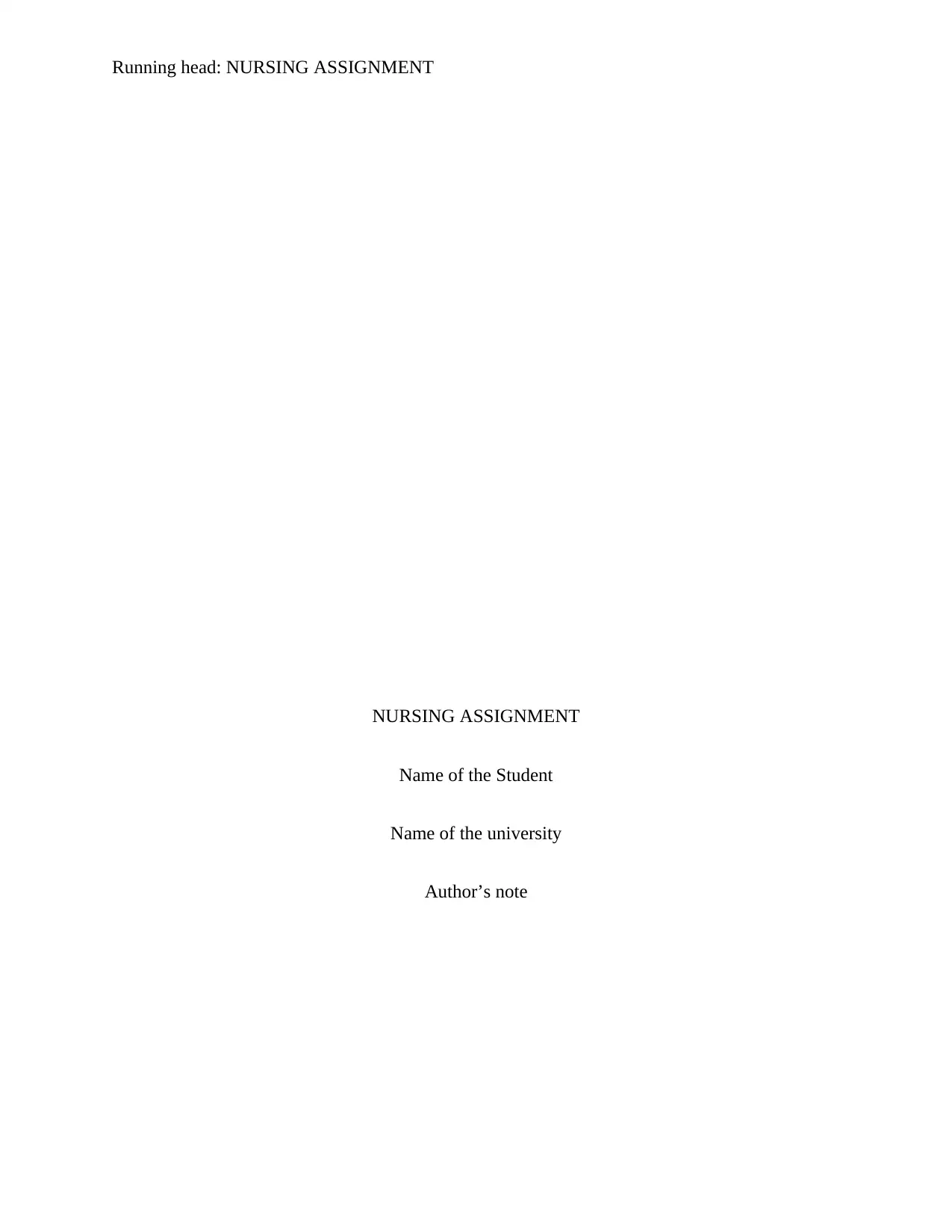
Running head: NURSING ASSIGNMENT
NURSING ASSIGNMENT
Name of the Student
Name of the university
Author’s note
NURSING ASSIGNMENT
Name of the Student
Name of the university
Author’s note
Paraphrase This Document
Need a fresh take? Get an instant paraphrase of this document with our AI Paraphraser
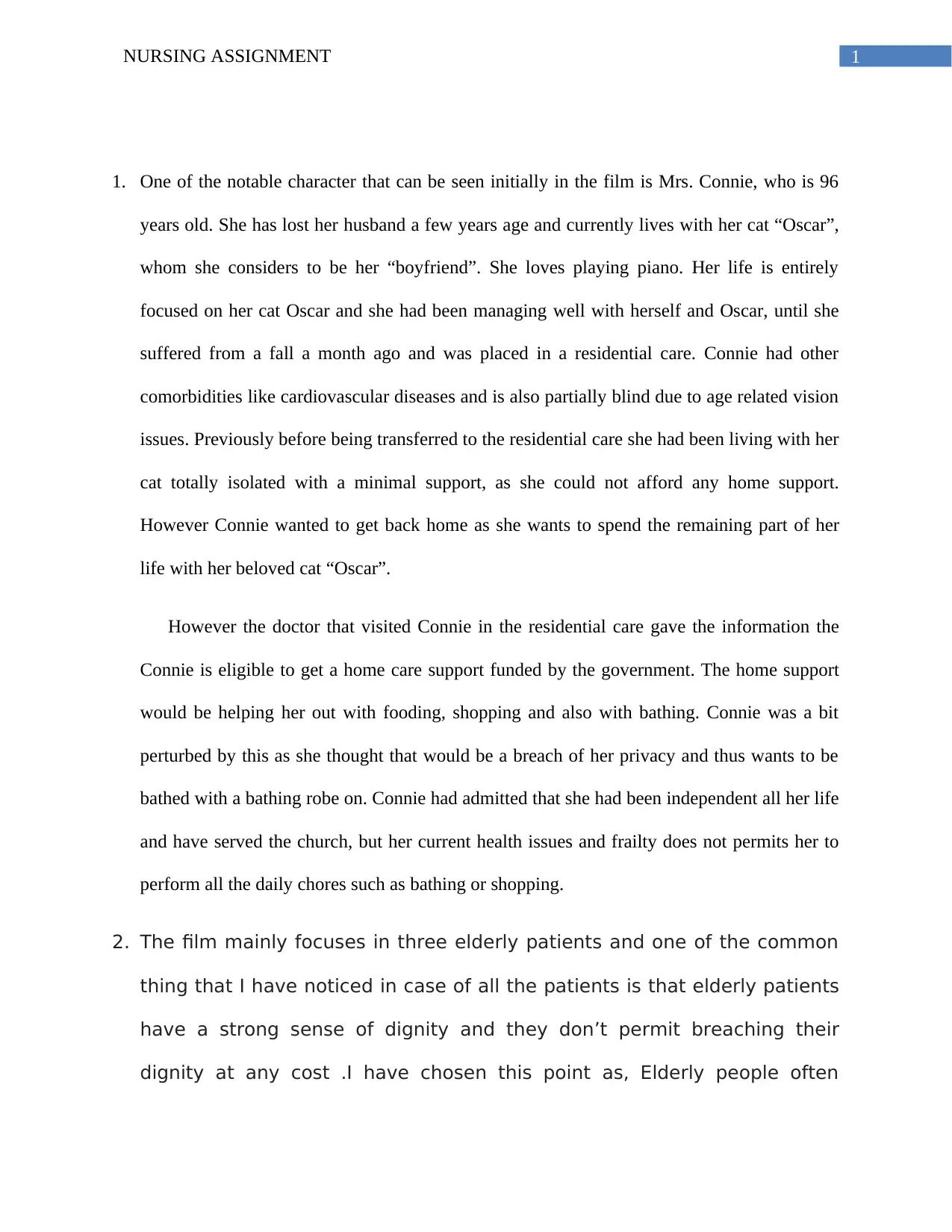
1NURSING ASSIGNMENT
1. One of the notable character that can be seen initially in the film is Mrs. Connie, who is 96
years old. She has lost her husband a few years age and currently lives with her cat “Oscar”,
whom she considers to be her “boyfriend”. She loves playing piano. Her life is entirely
focused on her cat Oscar and she had been managing well with herself and Oscar, until she
suffered from a fall a month ago and was placed in a residential care. Connie had other
comorbidities like cardiovascular diseases and is also partially blind due to age related vision
issues. Previously before being transferred to the residential care she had been living with her
cat totally isolated with a minimal support, as she could not afford any home support.
However Connie wanted to get back home as she wants to spend the remaining part of her
life with her beloved cat “Oscar”.
However the doctor that visited Connie in the residential care gave the information the
Connie is eligible to get a home care support funded by the government. The home support
would be helping her out with fooding, shopping and also with bathing. Connie was a bit
perturbed by this as she thought that would be a breach of her privacy and thus wants to be
bathed with a bathing robe on. Connie had admitted that she had been independent all her life
and have served the church, but her current health issues and frailty does not permits her to
perform all the daily chores such as bathing or shopping.
2. The film mainly focuses in three elderly patients and one of the common
thing that I have noticed in case of all the patients is that elderly patients
have a strong sense of dignity and they don’t permit breaching their
dignity at any cost .I have chosen this point as, Elderly people often
1. One of the notable character that can be seen initially in the film is Mrs. Connie, who is 96
years old. She has lost her husband a few years age and currently lives with her cat “Oscar”,
whom she considers to be her “boyfriend”. She loves playing piano. Her life is entirely
focused on her cat Oscar and she had been managing well with herself and Oscar, until she
suffered from a fall a month ago and was placed in a residential care. Connie had other
comorbidities like cardiovascular diseases and is also partially blind due to age related vision
issues. Previously before being transferred to the residential care she had been living with her
cat totally isolated with a minimal support, as she could not afford any home support.
However Connie wanted to get back home as she wants to spend the remaining part of her
life with her beloved cat “Oscar”.
However the doctor that visited Connie in the residential care gave the information the
Connie is eligible to get a home care support funded by the government. The home support
would be helping her out with fooding, shopping and also with bathing. Connie was a bit
perturbed by this as she thought that would be a breach of her privacy and thus wants to be
bathed with a bathing robe on. Connie had admitted that she had been independent all her life
and have served the church, but her current health issues and frailty does not permits her to
perform all the daily chores such as bathing or shopping.
2. The film mainly focuses in three elderly patients and one of the common
thing that I have noticed in case of all the patients is that elderly patients
have a strong sense of dignity and they don’t permit breaching their
dignity at any cost .I have chosen this point as, Elderly people often
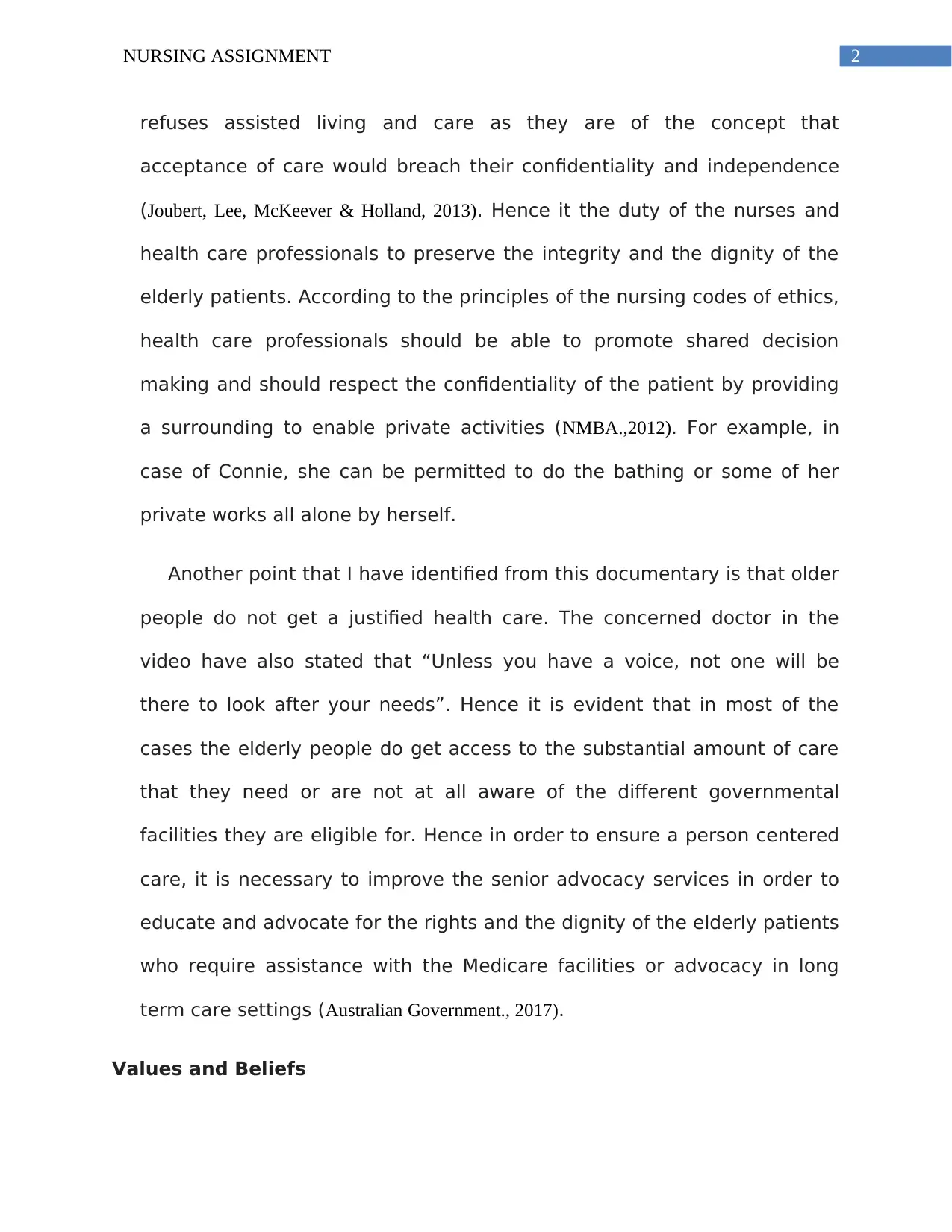
2NURSING ASSIGNMENT
refuses assisted living and care as they are of the concept that
acceptance of care would breach their confidentiality and independence
(Joubert, Lee, McKeever & Holland, 2013). Hence it the duty of the nurses and
health care professionals to preserve the integrity and the dignity of the
elderly patients. According to the principles of the nursing codes of ethics,
health care professionals should be able to promote shared decision
making and should respect the confidentiality of the patient by providing
a surrounding to enable private activities (NMBA.,2012). For example, in
case of Connie, she can be permitted to do the bathing or some of her
private works all alone by herself.
Another point that I have identified from this documentary is that older
people do not get a justified health care. The concerned doctor in the
video have also stated that “Unless you have a voice, not one will be
there to look after your needs”. Hence it is evident that in most of the
cases the elderly people do get access to the substantial amount of care
that they need or are not at all aware of the different governmental
facilities they are eligible for. Hence in order to ensure a person centered
care, it is necessary to improve the senior advocacy services in order to
educate and advocate for the rights and the dignity of the elderly patients
who require assistance with the Medicare facilities or advocacy in long
term care settings (Australian Government., 2017).
Values and Beliefs
refuses assisted living and care as they are of the concept that
acceptance of care would breach their confidentiality and independence
(Joubert, Lee, McKeever & Holland, 2013). Hence it the duty of the nurses and
health care professionals to preserve the integrity and the dignity of the
elderly patients. According to the principles of the nursing codes of ethics,
health care professionals should be able to promote shared decision
making and should respect the confidentiality of the patient by providing
a surrounding to enable private activities (NMBA.,2012). For example, in
case of Connie, she can be permitted to do the bathing or some of her
private works all alone by herself.
Another point that I have identified from this documentary is that older
people do not get a justified health care. The concerned doctor in the
video have also stated that “Unless you have a voice, not one will be
there to look after your needs”. Hence it is evident that in most of the
cases the elderly people do get access to the substantial amount of care
that they need or are not at all aware of the different governmental
facilities they are eligible for. Hence in order to ensure a person centered
care, it is necessary to improve the senior advocacy services in order to
educate and advocate for the rights and the dignity of the elderly patients
who require assistance with the Medicare facilities or advocacy in long
term care settings (Australian Government., 2017).
Values and Beliefs
⊘ This is a preview!⊘
Do you want full access?
Subscribe today to unlock all pages.

Trusted by 1+ million students worldwide
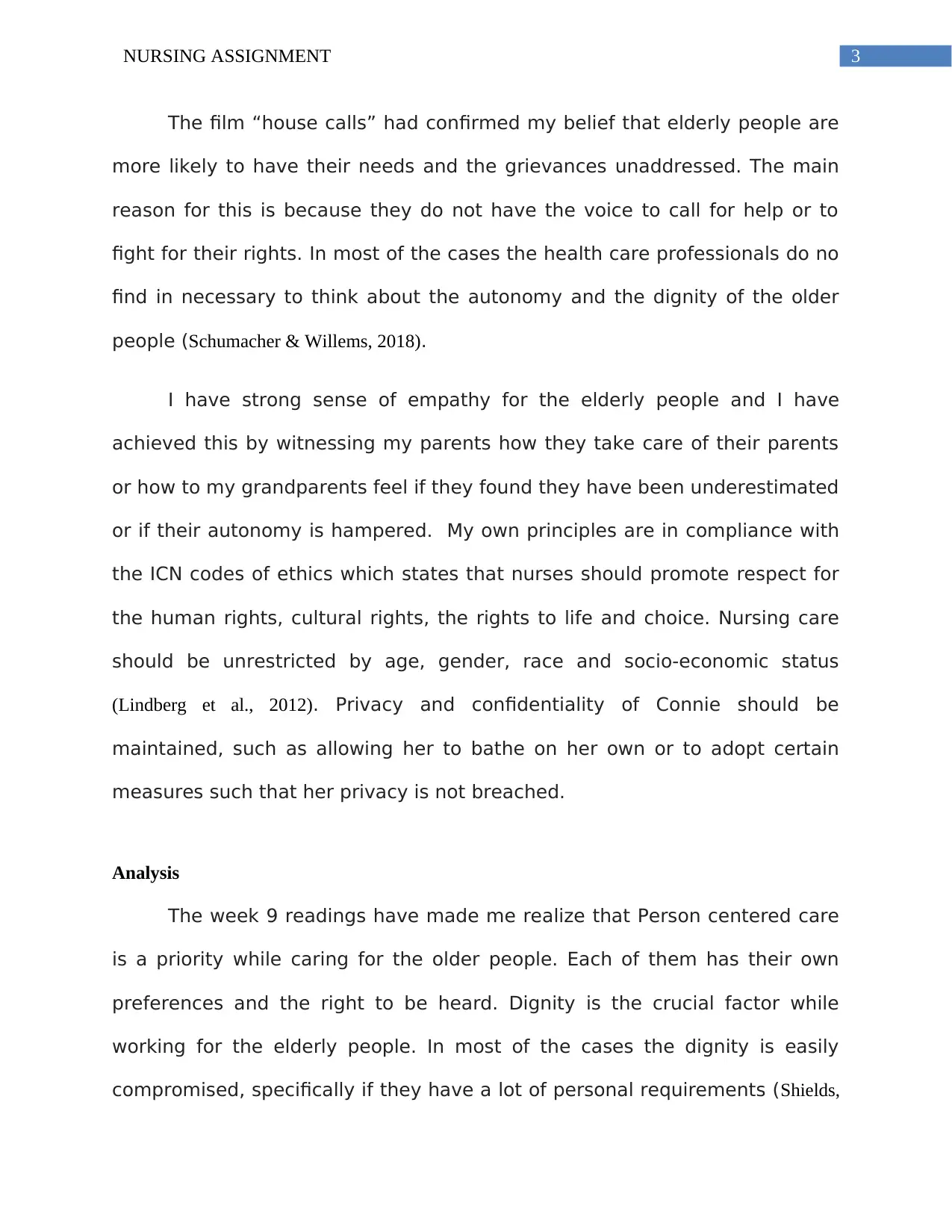
3NURSING ASSIGNMENT
The film “house calls” had confirmed my belief that elderly people are
more likely to have their needs and the grievances unaddressed. The main
reason for this is because they do not have the voice to call for help or to
fight for their rights. In most of the cases the health care professionals do no
find in necessary to think about the autonomy and the dignity of the older
people (Schumacher & Willems, 2018).
I have strong sense of empathy for the elderly people and I have
achieved this by witnessing my parents how they take care of their parents
or how to my grandparents feel if they found they have been underestimated
or if their autonomy is hampered. My own principles are in compliance with
the ICN codes of ethics which states that nurses should promote respect for
the human rights, cultural rights, the rights to life and choice. Nursing care
should be unrestricted by age, gender, race and socio-economic status
(Lindberg et al., 2012). Privacy and confidentiality of Connie should be
maintained, such as allowing her to bathe on her own or to adopt certain
measures such that her privacy is not breached.
Analysis
The week 9 readings have made me realize that Person centered care
is a priority while caring for the older people. Each of them has their own
preferences and the right to be heard. Dignity is the crucial factor while
working for the elderly people. In most of the cases the dignity is easily
compromised, specifically if they have a lot of personal requirements (Shields,
The film “house calls” had confirmed my belief that elderly people are
more likely to have their needs and the grievances unaddressed. The main
reason for this is because they do not have the voice to call for help or to
fight for their rights. In most of the cases the health care professionals do no
find in necessary to think about the autonomy and the dignity of the older
people (Schumacher & Willems, 2018).
I have strong sense of empathy for the elderly people and I have
achieved this by witnessing my parents how they take care of their parents
or how to my grandparents feel if they found they have been underestimated
or if their autonomy is hampered. My own principles are in compliance with
the ICN codes of ethics which states that nurses should promote respect for
the human rights, cultural rights, the rights to life and choice. Nursing care
should be unrestricted by age, gender, race and socio-economic status
(Lindberg et al., 2012). Privacy and confidentiality of Connie should be
maintained, such as allowing her to bathe on her own or to adopt certain
measures such that her privacy is not breached.
Analysis
The week 9 readings have made me realize that Person centered care
is a priority while caring for the older people. Each of them has their own
preferences and the right to be heard. Dignity is the crucial factor while
working for the elderly people. In most of the cases the dignity is easily
compromised, specifically if they have a lot of personal requirements (Shields,
Paraphrase This Document
Need a fresh take? Get an instant paraphrase of this document with our AI Paraphraser
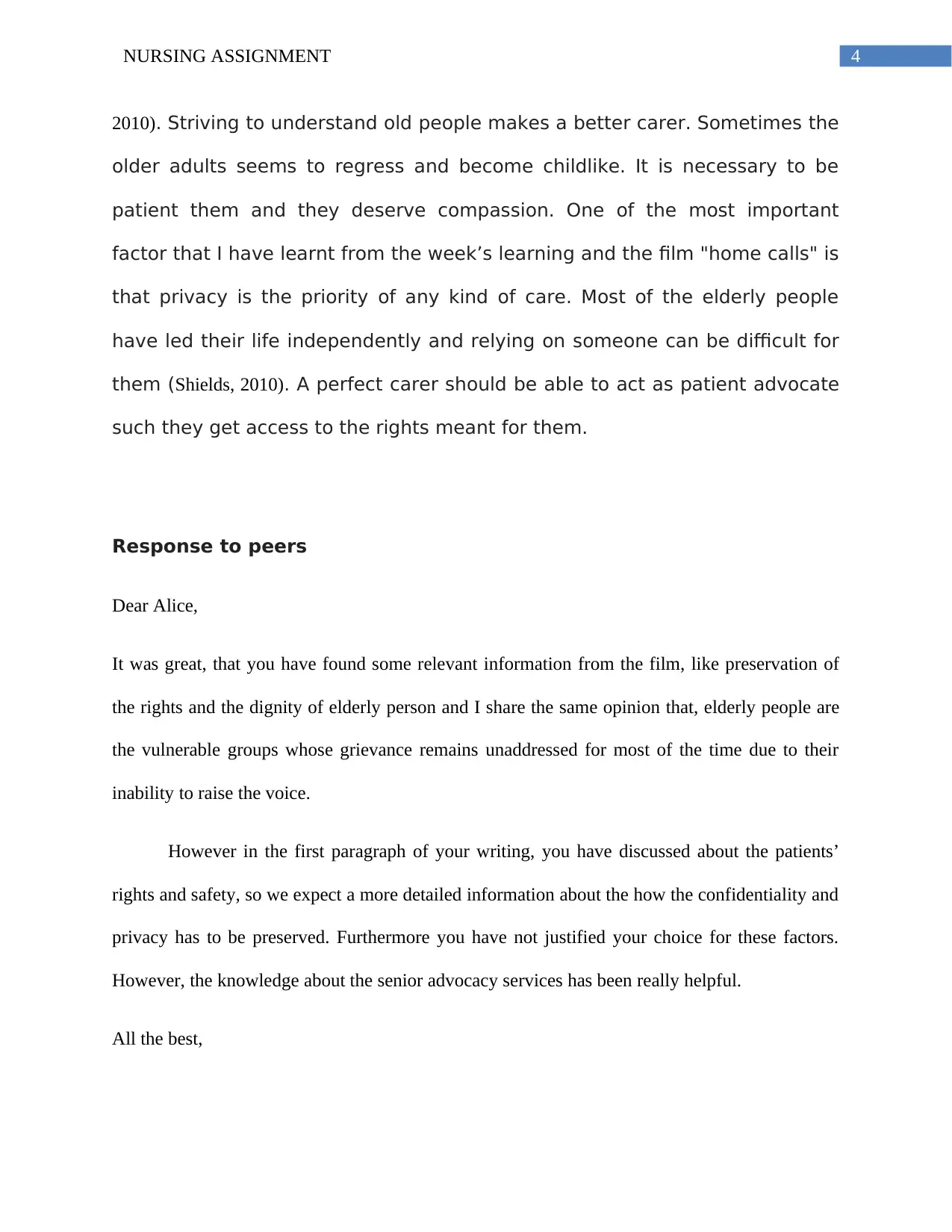
4NURSING ASSIGNMENT
2010). Striving to understand old people makes a better carer. Sometimes the
older adults seems to regress and become childlike. It is necessary to be
patient them and they deserve compassion. One of the most important
factor that I have learnt from the week’s learning and the film "home calls" is
that privacy is the priority of any kind of care. Most of the elderly people
have led their life independently and relying on someone can be difficult for
them (Shields, 2010). A perfect carer should be able to act as patient advocate
such they get access to the rights meant for them.
Response to peers
Dear Alice,
It was great, that you have found some relevant information from the film, like preservation of
the rights and the dignity of elderly person and I share the same opinion that, elderly people are
the vulnerable groups whose grievance remains unaddressed for most of the time due to their
inability to raise the voice.
However in the first paragraph of your writing, you have discussed about the patients’
rights and safety, so we expect a more detailed information about the how the confidentiality and
privacy has to be preserved. Furthermore you have not justified your choice for these factors.
However, the knowledge about the senior advocacy services has been really helpful.
All the best,
2010). Striving to understand old people makes a better carer. Sometimes the
older adults seems to regress and become childlike. It is necessary to be
patient them and they deserve compassion. One of the most important
factor that I have learnt from the week’s learning and the film "home calls" is
that privacy is the priority of any kind of care. Most of the elderly people
have led their life independently and relying on someone can be difficult for
them (Shields, 2010). A perfect carer should be able to act as patient advocate
such they get access to the rights meant for them.
Response to peers
Dear Alice,
It was great, that you have found some relevant information from the film, like preservation of
the rights and the dignity of elderly person and I share the same opinion that, elderly people are
the vulnerable groups whose grievance remains unaddressed for most of the time due to their
inability to raise the voice.
However in the first paragraph of your writing, you have discussed about the patients’
rights and safety, so we expect a more detailed information about the how the confidentiality and
privacy has to be preserved. Furthermore you have not justified your choice for these factors.
However, the knowledge about the senior advocacy services has been really helpful.
All the best,
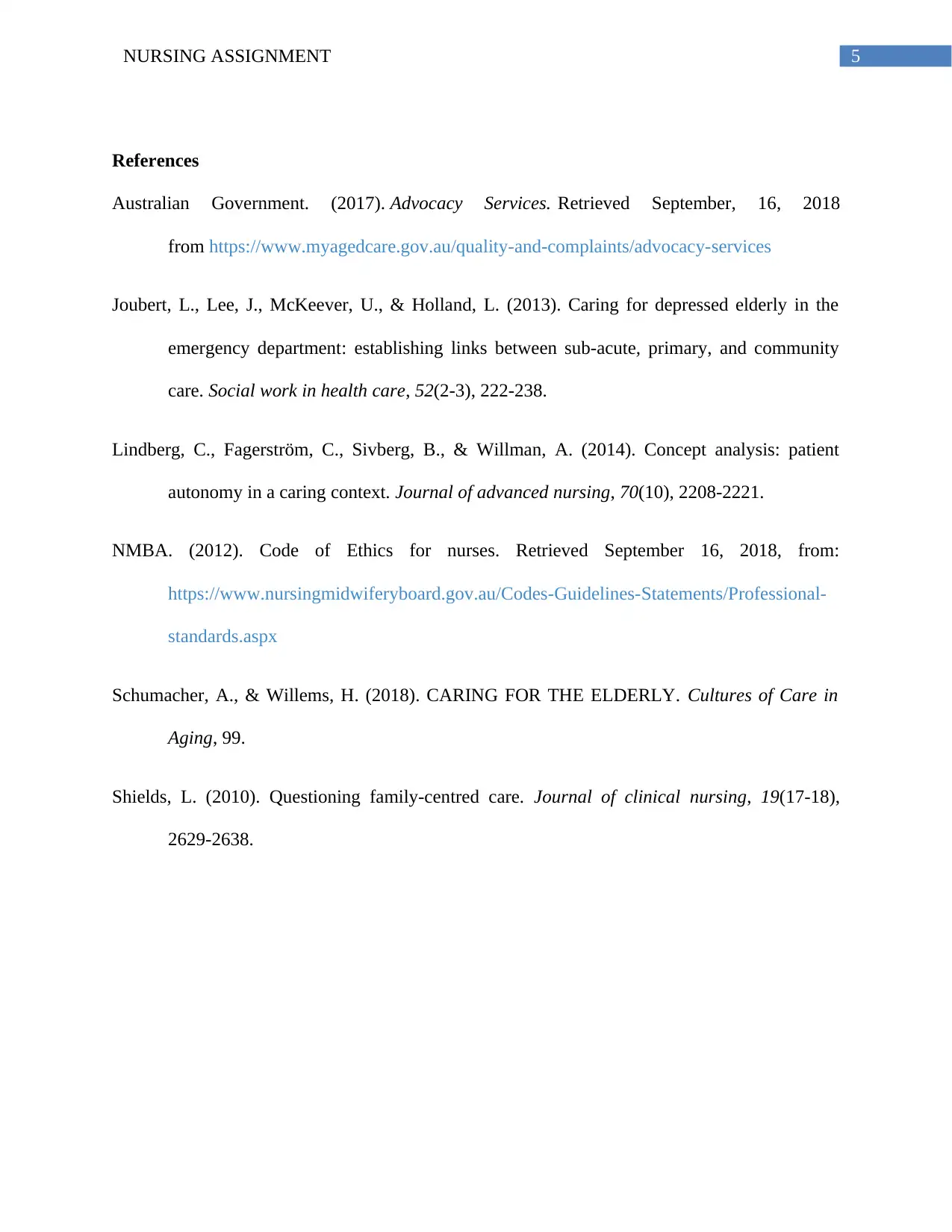
5NURSING ASSIGNMENT
References
Australian Government. (2017). Advocacy Services. Retrieved September, 16, 2018
from https://www.myagedcare.gov.au/quality-and-complaints/advocacy-services
Joubert, L., Lee, J., McKeever, U., & Holland, L. (2013). Caring for depressed elderly in the
emergency department: establishing links between sub-acute, primary, and community
care. Social work in health care, 52(2-3), 222-238.
Lindberg, C., Fagerström, C., Sivberg, B., & Willman, A. (2014). Concept analysis: patient
autonomy in a caring context. Journal of advanced nursing, 70(10), 2208-2221.
NMBA. (2012). Code of Ethics for nurses. Retrieved September 16, 2018, from:
https://www.nursingmidwiferyboard.gov.au/Codes-Guidelines-Statements/Professional-
standards.aspx
Schumacher, A., & Willems, H. (2018). CARING FOR THE ELDERLY. Cultures of Care in
Aging, 99.
Shields, L. (2010). Questioning family‐centred care. Journal of clinical nursing, 19(17‐18),
2629-2638.
References
Australian Government. (2017). Advocacy Services. Retrieved September, 16, 2018
from https://www.myagedcare.gov.au/quality-and-complaints/advocacy-services
Joubert, L., Lee, J., McKeever, U., & Holland, L. (2013). Caring for depressed elderly in the
emergency department: establishing links between sub-acute, primary, and community
care. Social work in health care, 52(2-3), 222-238.
Lindberg, C., Fagerström, C., Sivberg, B., & Willman, A. (2014). Concept analysis: patient
autonomy in a caring context. Journal of advanced nursing, 70(10), 2208-2221.
NMBA. (2012). Code of Ethics for nurses. Retrieved September 16, 2018, from:
https://www.nursingmidwiferyboard.gov.au/Codes-Guidelines-Statements/Professional-
standards.aspx
Schumacher, A., & Willems, H. (2018). CARING FOR THE ELDERLY. Cultures of Care in
Aging, 99.
Shields, L. (2010). Questioning family‐centred care. Journal of clinical nursing, 19(17‐18),
2629-2638.
⊘ This is a preview!⊘
Do you want full access?
Subscribe today to unlock all pages.

Trusted by 1+ million students worldwide
1 out of 6
Related Documents
Your All-in-One AI-Powered Toolkit for Academic Success.
+13062052269
info@desklib.com
Available 24*7 on WhatsApp / Email
![[object Object]](/_next/static/media/star-bottom.7253800d.svg)
Unlock your academic potential
Copyright © 2020–2025 A2Z Services. All Rights Reserved. Developed and managed by ZUCOL.




